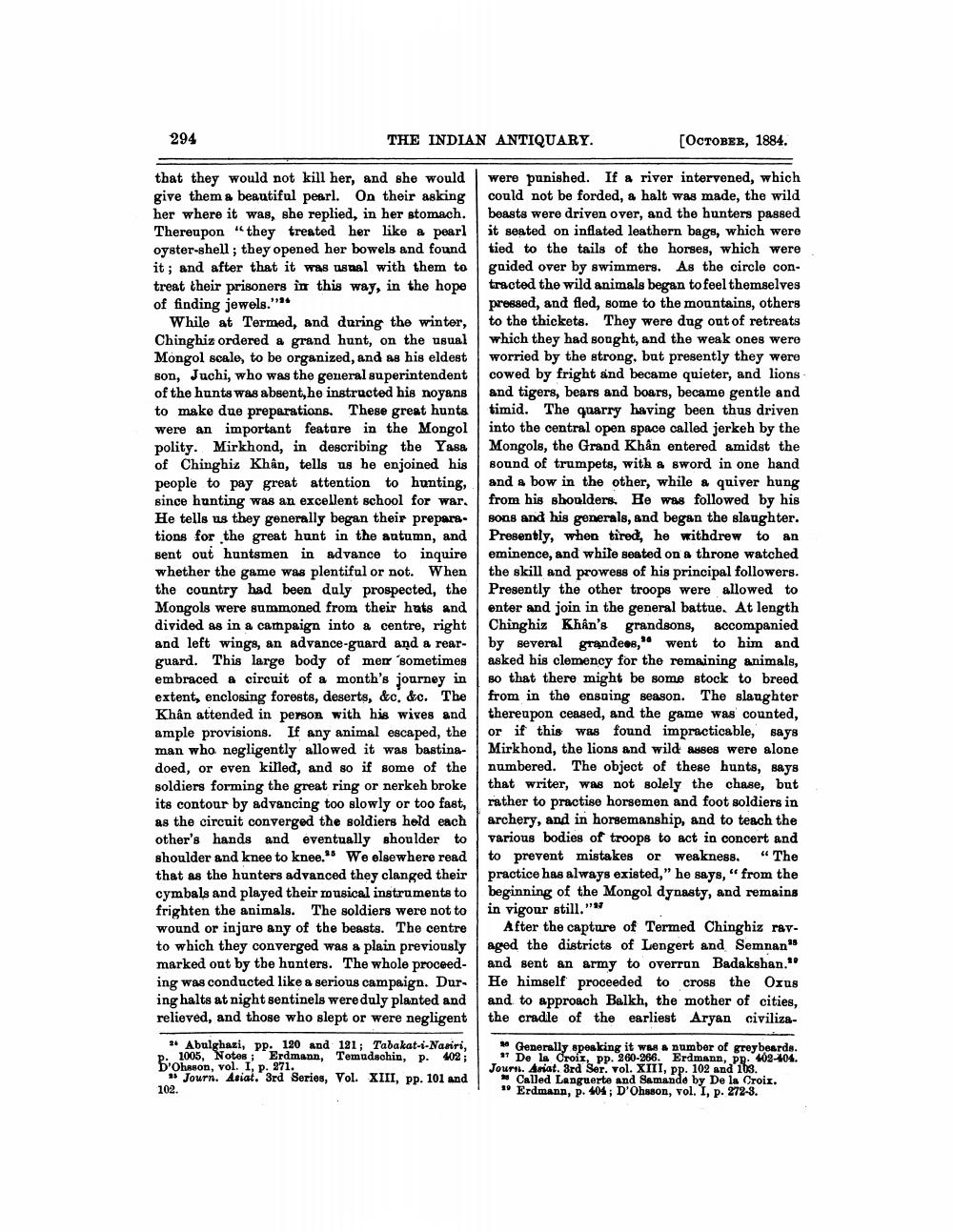________________
294
THE INDIAN ANTIQUARY.
[OCTOBER, 1884.
that they would not kill her, and she would give them a beautiful pearl. On their asking her where it was, she replied, in her stomach. Thereupon "they treated her like a pearl oyster-shell; they opened her bowels and found it; and after that it was usual with them to treat their prisoners in this way, in the hope of finding jewels."
While at Termed, and during the winter, Chinghiz ordered a grand hunt, on the usual Mongol scale, to be organized, and as his eldest son, Juchi, who was the general superintendent of the hunts was absent, he instructed his noyans to make due preparations. These great hunts were an important feature in the Mongol polity. Mirkhond, in describing the Yasa of Chinghiz Khân, tells us he enjoined his people to pay great attention to hunting, since hunting was an excellent school for war. He tells us they generally began their preparations for the great hunt in the autumn, and sent out huntsmen in advance to inquire whether the game was plentiful or not. When the country had been duly prospected, the Mongols were summoned from their huts and divided as in a campaign into a centre, right and left wings, an advance-guard and a rearguard. This large body of merr 'sometimes embraced a circuit of a month's journey in extent, enclosing forests, deserts, &c. &c. The Khân attended in person with his wives and ample provisions. If any animal escaped, the man who negligently allowed it was bastinadoed, or even killed, and so if some of the soldiers forming the great ring or nerkeh broke its contour by advancing too slowly or too fast, as the circuit converged the soldiers hold each other's hands and eventually shoulder to shoulder and knee to knee. We elsewhere read that as the hunters advanced they clanged their cymbals and played their rousical instruments to frighten the animals. The soldiers were not to wound or injure any of the beasts. The centre to which they converged was a plain previously marked out by the hunters. The whole proceeding was conducted like a serious campaign. During halts at night sentinels were duly planted and relieved, and those who slept or were negligent
were punished. If a river intervened, which could not be forded, a halt was made, the wild beasts were driven over, and the hunters passed it seated on inflated leathern bags, which were tied to the tails of the horses, which were guided over by swimmers. As the circle contracted the wild animals began to feel themselves pressed, and fled, some to the mountains, others to the thickets. They were dug out of retreats which they had sought, and the weak ones were worried by the strong, but presently they were cowed by fright and became quieter, and lions and tigers, bears and boars, became gentle and timid. The quarry having been thus driven into the central open space called jerkeb by the Mongols, the Grand Khån entered amidst the sound of trumpets, with a sword in one hand and a bow in the other, while a quiver hung from his shoulders. He was followed by his sons and his generals, and began the slaughter. Presently, when tired, he withdrew to an eminence, and while seated on a throne watched the skill and prowess of his principal followers. Presently the other troops were allowed to enter and join in the general battue. At length Chinghiz Khan's grandsons, accompanied by several grandees," went to him and asked his clemency for the remaining animals, so that there might be some stock to breed from in the ensuing season. The slaughter thereupon ceased, and the game was counted, or if this was found impracticable, says Mirkhond, the lions and wild anses were alone numbered. The object of these bunts, says that writer, was not solely the chase, but rather to practise horsemen and foot soldiers in archery, and in horsemanship, and to teach the various bodies of troops to act in concert and to prevent mistakes or weakness. " The practice has always existed," he says, " from the beginning of the Mongol dynasty, and remains in vigour still."
After the capture of Termed Chinghiz ravaged the districts of Lengert and Semnan" and sent an army to overrun Badakshan." He himself proceeded to cross the Oxus and to approach Balkh, the mother of cities, the cradle of the earliest Aryan civiliza
3* Abulghazi, pp. 120 and 191; Tabakat-i-Nasiri, p. 1005, Notos Erdmann, Temudschin, p. 402; D'Ohsson, vol. I, p. 271.
** Journ. Asiat. 3rd Series, Vol. XIII, pp. 101 and 102.
Generally speaking it was a number of greyboards. 17 De la Croix, pp. 260-266. Erdmann, pp. 402-404. Jouri. Asiat. 3rd Ser. vol. XIII, pp. 102 and 103.
Called Languerte and Samanda by De la Croix. " Erdmann, p. 404; D'Ohsson, vol. I, p. 272-3.




